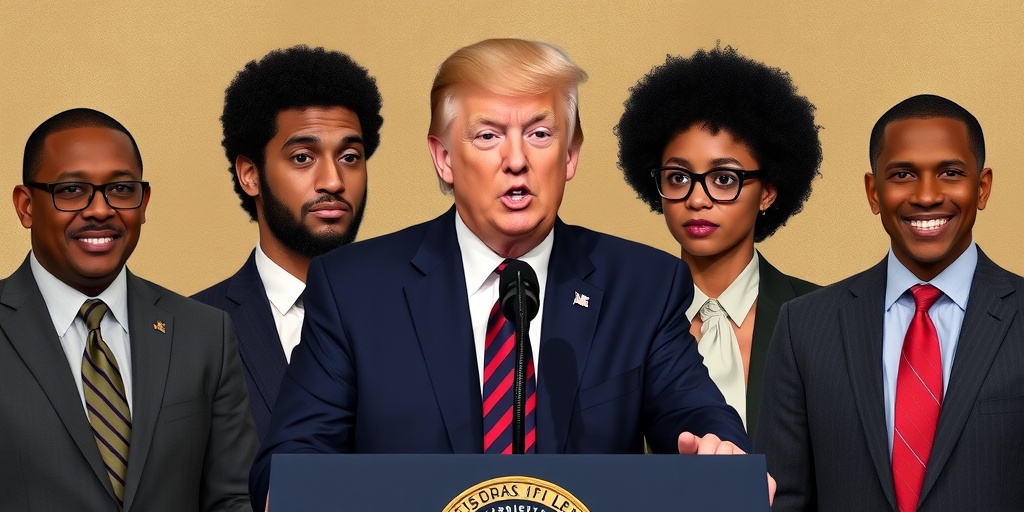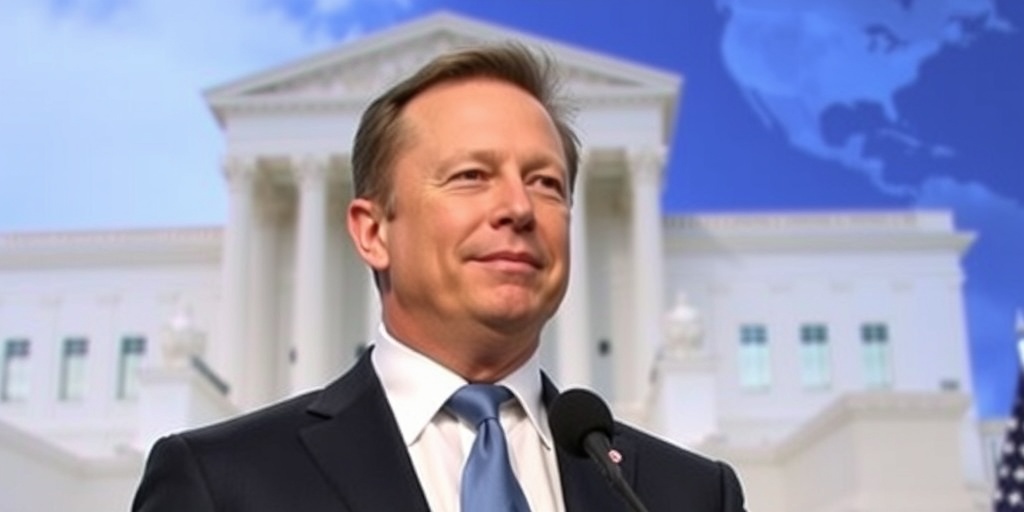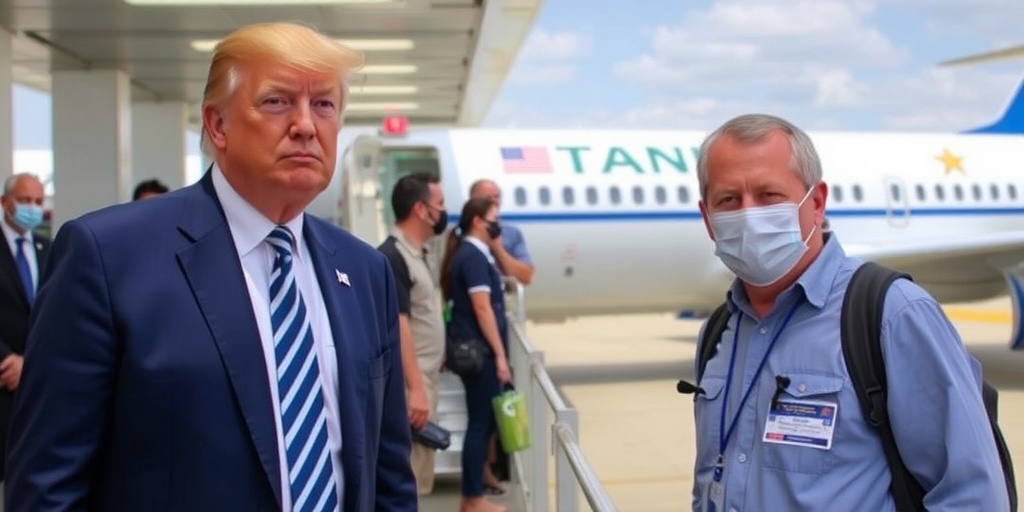Now Reading: Trump Celebrates Black History Month While Criticizing Diversity
-
01
Trump Celebrates Black History Month While Criticizing Diversity
Trump Celebrates Black History Month While Criticizing Diversity

Title: Dissonance at the White House Black History Month Reception
On Thursday, the White House hosted a Black History Month reception marked by grandeur and celebratory spirit. Guests savored champagne and gourmet bites, including lamb chops and collard greens, amidst a lively atmosphere filled with selfies and social media buzz. The arrival of President Trump, flanked by golf superstar Tiger Woods, elicited cheers from the crowd, which eagerly recorded the moment on their phones.
However, the event was overshadowed by a palpable dissonance that characterized the gatherings. While Trump took the opportunity to honor the achievements of Black Americans, he was simultaneously criticized for his administration’s actions that have targeted federal initiatives designed to address systemic inequality. Since his inauguration, Trump has dismantled numerous programs aimed at fostering equity and has contended that civil rights efforts have victimized white individuals. His controversial remarks extended to linking a tragic plane crash over the Potomac River to diversity programs within the Federal Aviation Administration.
During the reception, Trump lavished praise on prominent figures in the Black community, seeking to demonstrate his appreciation. He opened his speech by exclaiming, “Let me ask you, is there anybody like our Tiger?” referencing Woods. Throughout his address, the president frequently cited Woods as a symbol of Black progress, also recognizing legends such as Muhammad Ali and Kobe Bryant.
Yet, Trump’s remarks notably lacked focus on pressing issues that disproportionately affect the Black community. Topics such as poverty, the wealth gap between Black and white Americans, and gun violence received scant acknowledgment. Trump vowed to commemorate Black history by planning to erect statues of notable figures, including Prince Estabrook, the first Black American to fight in the Revolutionary War, alongside icons like Harriet Tubman, Rosa Parks, Billie Holiday, and Aretha Franklin. Notably, Trump hinted that Woods might also be honored in the future.
Perhaps most controversial was Trump’s criticism of the previous administration’s emphasis on 1619—the year the first enslaved Africans reportedly arrived in America. Trump framed this historical focus as reductive, aligning himself with conservatives who have denounced the “1619 Project” initiated by The New York Times, which scrutinized slavery’s profound impact on the nation’s history. In response, Trump formed the 1776 Commission to promote a celebratory account of American history centered around the ideals enshrined in the Declaration of Independence.
Despite initial speculation regarding the continuation of Black History Month festivities in light of Trump’s executive orders curbing such events, the White House proceeded with the celebration. Press Secretary Karoline Leavitt had sidestepped inquiries about the occasion’s continuation, instead emphasizing that the administration would honor contributions from all Americans.
Critics of Trump highlighted the contradictory nature of the celebration, suggesting it exemplified his simultaneous celebration and undermining of Black history. Derrick Johnson, president of the NAACP, famously remarked, "This White House celebrating Black history is like asking a cow to serve steak," referring to the stark juxtaposition of the administration’s present actions against historical acknowledgment.
Defending the administration’s agenda, officials asserted that the moves against diversity, equity, and inclusion (DEI) programs aimed to eradicate perceived reverse discrimination while promoting a "colorblind" society. They argued that such policies were unnecessary, framing them as burdens on economic and public safety.
On the contrary, Black leaders who supported Trump, such as Senator Tim Scott of South Carolina and Scott Turner, head of the Department of Housing and Urban Development, were present at the celebration. They, alongside conservative figures like journalist Sage Steele and attorney Leo Terrell, donned various "Make America Great Again" hats, underscoring their allegiance to Trump’s vision.
Reverend Steven Perry, a Michigan pastor who supported Trump after initially voting for Biden, expressed pride in his attendance, emphasizing the importance of leaders who prioritize action over emotional placation when addressing challenges facing the Black community. He asserted, “Nobody can take away what we’ve done in this country — it’s evident.”
Other attendees, such as Dr. Courtney R. Baker from the University of California, Riverside, criticized the event as insufficient and disconnected from the realities faced by African Americans. Comparing the celebration to a token episodic acknowledgment of racism, she characterized it as a superficial gesture that failed to address systemic issues.
In sharp contrast, Damon Hewitt, president of the Lawyers’ Committee for Civil Rights Under Law, articulated frustration, framing the event as a reminder of the ongoing struggles within the Black community. He stated, “What he seems to be celebrating is the support he believes he received from Black supporters, so again, it’s about him, not about us,” characterizing the celebration as a "cruel joke."
The Black History Month reception served as a vivid illustration of the complexities surrounding Trump’s relationship with the Black community—a juxtaposition of celebration intertwined with criticism of policy decisions, raising questions about the meaning of historical acknowledgment in contemporary America.
Stay Informed With the Latest & Most Important News
Previous Post
Next Post
-
 01New technology breakthrough has everyone talking right now
01New technology breakthrough has everyone talking right now -
 02Unbelievable life hack everyone needs to try today
02Unbelievable life hack everyone needs to try today -
 03Fascinating discovery found buried deep beneath the ocean
03Fascinating discovery found buried deep beneath the ocean -
 04Man invents genius device that solves everyday problems
04Man invents genius device that solves everyday problems -
 05Shocking discovery that changes what we know forever
05Shocking discovery that changes what we know forever -
 06Internet goes wild over celebrity’s unexpected fashion choice
06Internet goes wild over celebrity’s unexpected fashion choice -
 07Rare animal sighting stuns scientists and wildlife lovers
07Rare animal sighting stuns scientists and wildlife lovers





















